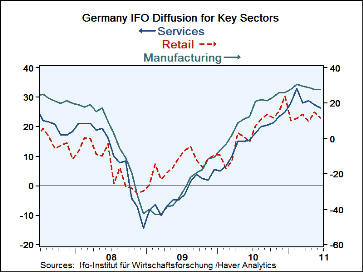 Global| Jun 24 2011
Global| Jun 24 2011Mild Declines by Sector for IFO Survey
Summary
Germany's well-regarded IFO survey shows there has been minimal erosion in the various German key economic sectors. All sectors stand in the top 20% or in a much better position of their historic ranges of hi-low values. When ranked [...]
 Germany's well-regarded IFO survey shows there has been minimal erosion in the various German key economic sectors.
All sectors stand in the top 20% or in a much better position of their historic ranges of hi-low values.
When ranked and placed in their historic queues the current standings appear even higher (not shown).
Germany's well-regarded IFO survey shows there has been minimal erosion in the various German key economic sectors.
All sectors stand in the top 20% or in a much better position of their historic ranges of hi-low values.
When ranked and placed in their historic queues the current standings appear even higher (not shown).
Still there is some erosion in gear in Germany. The retail index at 11.5 is down relatively sharply on the month and is off by some 51% from its cycle high –in this cycle. But the retailing peak was a very short-lived one month spike that is not representative of the progress the sector has made. In broader terms retailing is actually holding its ground if we set that one peak reading aside. Services fell while wholesaling rose on the month, but both sectors are off by about 20% from their respective current cycle highs. Manufacturing is off its current-cycle high by just 9.5% and construction is at its current-cycle high this month even though it still carries a negative reading. Overall the all-sector climate index is off its current-cycle high by just 7.5% and it edged higher this month.
The diffusion index for business confidence rose this month to 34.1 from 30.5 in May and it has risen to its cycle high. The diffusion reading for business expectations is lower at 8.8 in June compared to 11.0 in May and it has fallen for four straight months. Expectations, also a net diffusion concept, are down by 150% from their cycle high reading of 17.6. That shows perhaps that the 'worst is yet to come.'
Overall the erosion in German trends is clear but it is also less worrisome in this report compared to other reports where the speed of decline appears to be more severe, such as in the PMI reports.
Also Germany is sliding as at a slower rate than the EMU as a whole.
To some extent the IFO report is reassuring. But it does raise questions about the future...We will want to continue to monitor it and especially to see its details once they are filled in with the final version of this report.
| Summary of IFO Sector Diffusion Readings: CLIMATE | ||||||||
|---|---|---|---|---|---|---|---|---|
| CLIMATE | Current | Last Mo | Since Jan 1991* | |||||
| Jun-11 | May-11 | Avg | Median | Max | Min | Range | %Range | |
| All Sectors | 21.1 | 20.6 | -6.6 | -7.3 | 22.8 | -36.7 | 59.5 | 97.1% |
| MFG | 27.7 | 27.8 | 1.2 | 3.1 | 30.6 | -43.1 | 73.7 | 96.1% |
| Construction | -2.0 | -5.6 | -28.8 | -29.6 | -2.0 | -49.7 | 47.7 | 100.0% |
| Wholesale | 21.5 | 17.1 | -11.4 | -13.9 | 27.4 | -38.6 | 66.0 | 91.1% |
| Retail | 11.5 | 15.1 | -15.9 | -16.1 | 23.9 | -41.6 | 65.5 | 81.1% |
| Services | 26.4 | 27.4 | 14.1 | 17.2 | 33.0 | -14.5 | 47.5 | 86.1% |
| Current conditions:ll | 34.1 | 30.5 | -7.2 | -9.8 | 34.1 | -38.6 | 42.7 | 1.0 |
| Expectations:All | 8.8 | 11.0 | -2.7 | -1.2 | 17.6 | -45.8 | 63.4 | 0.9 |
| * June 2001 for Services | ||||||||
Robert Brusca
AuthorMore in Author Profile »Robert A. Brusca is Chief Economist of Fact and Opinion Economics, a consulting firm he founded in Manhattan. He has been an economist on Wall Street for over 25 years. He has visited central banking and large institutional clients in over 30 countries in his career as an economist. Mr. Brusca was a Divisional Research Chief at the Federal Reserve Bank of NY (Chief of the International Financial markets Division), a Fed Watcher at Irving Trust and Chief Economist at Nikko Securities International. He is widely quoted and appears in various media. Mr. Brusca holds an MA and Ph.D. in economics from Michigan State University and a BA in Economics from the University of Michigan. His research pursues his strong interests in non aligned policy economics as well as international economics. FAO Economics’ research targets investors to assist them in making better investment decisions in stocks, bonds and in a variety of international assets. The company does not manage money and has no conflicts in giving economic advice.






